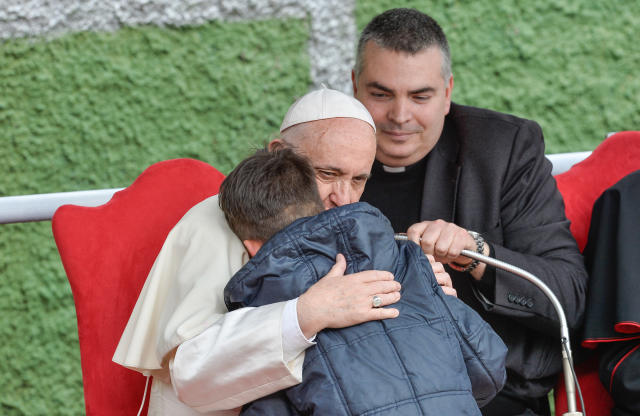Heartsick Boy Asks If Atheist Dad Is In Heaven. Pope Francis Reveals The Answer With A Hug.
My heart breaks for this boy. The loss of a father at a young age, especially this young, is a tragedy no child should have to endure. The young boy in this story, Emanuele, recently lost his father and was part of a group that was invited to ask Pope Francis questions. Emanuele was invited to the stage to whisper his question into the Pope's ear because he was too nervous and emotional to ask from the microphone. On the stage with the Pope's arms tenderly wrapped around him he told the Pope that his father was an atheist and had recently died, but had ensured his children were all baptized. He then asked the Pope, "Is my father in heaven?" Before I dive into expressing my concerns for how Pope Francis answered that question, I want to be clear that I applaud the tenderness, humility, and empathy that Pope Francis displayed. The child needed a hug. He gave him one.
The question the young boy asked is a difficult one to answer with pastoral tenderness and truth. But, any answer worth giving must include both. Pope Francis basically answered the boy by saying that his father's good works, demonstrated in having his children baptized, were evidence that God would accept him into heaven. Pope Francis was clearly tender, but he either intentionally muddled the gospel or he applied the faulty Catholic understanding of it. Ultimately, I think it was both. Perhaps he was applying the Catholic doctrine of purgatory. In that case, he was telling this young child (without really telling him) that the good works of his father will eventually help him escape purgatory and then, maybe, he will be in heaven - if enough people pray for his father and receive indulgences for his father and do whatever else the Catholic Church decides can shorten the timeline for the suffering of loved ones in purgatory.
The tragedy of the story is that Jesus was nowhere to be found in the conversation. It serves as a fresh reminder of the need for the truth of the gospel recovered in the Reformation. It's a reminder that, in fact, the Reformation is not over. It's a reminder that the debate of the Reformation isn't just about ivory tower theology, but about what we say to little children who ask questions about their deceased atheist father. It doesn't get any more real and pastoral than that.
The Pope failed to love the boy well because he failed to point him to Jesus, his only hope in life and death. He failed to make clear to the boy that it is only through faith in Christ that we can have any hope of eternity. He failed the boy because Emanuele walked away with some kind of vague understanding that good works have something to do with whether he gets to be with God for all eternity or not. That's a burden no human shoulders can bear.
With tenderness, Emanuele needed to be told that if his father trusted in Jesus, then there is no question that he is with God this very moment. He needed to be told that he too needs to look to Christ alone for hope and comfort during these difficult days. Those would have been difficult words to hear if he fully comprehended their weight. But, I would rather his tiny shoulders bear the weight of that grief so that he could find the capable and able shoulders of Jesus, on which he could place that grief and all of his sins. Instead, he walked away feeling a little bit better for the moment, but set up for a lifetime of bearing the weight of his sins on his own growing, but forever too weak, frail shoulders.


No comments:
Post a Comment